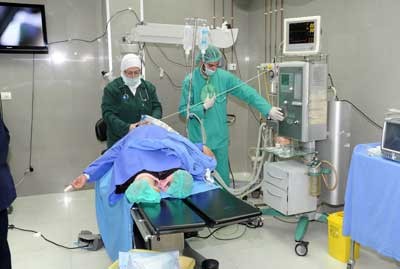DAMASCUS, (ST) – Minister of Health, Dr. Sa’ad al- Nayef, confirmed that his ministry had provided unprecedented amounts of supplements of food that meet the nutrition needs of children during the next six months worth of 200 million Syrian Pounds and includes more than 1.5 million doses of vitamin A to children, ready therapeutic food and therapeutic baby milk.
During the opening of the national workshop organized by the Ministry of Health in cooperation with the World Food Program and UNICEF, the Minister talked about the preventive measures to improve the nutritional status of children in the current circumstances, pointing out that the ministry devoted its efforts to meet the needs of foodstuffs to families, especially in the areas of greatest need and to ensure improving the health status and upgrading nutritional health indicators.
“The ministry, since the beginning of the current crisis being experienced by Syria, is exerting efforts to improve the nutritional reality of children in collaboration with various public sectors and civil and relevant international organizations, stressing the need to pay more attention to the aspects related to the conservation of families’ health, especially environmental sanitation including the safety of food and water, child health and diarrhea control programs, encouraging breastfeeding program and reproductive health,” the minister pointed out.
The Minister underlined the need to “develop a strategy of action to counter malnutrition,” especially for families living in difficult conditions and enable them to exercise better nutritional options through the adoption of a national plan through which universal coverage for all communities and individuals targeted and affected including the centers of temporary residence the affected people.
“ Syria was over the last ten years at the forefront of Eastern countries in the Mediterranean Region in terms of good health indicators, especially in the field of maternal and child health, where it touched the progress that has been achieved in these aspects of the millennium development goals, explaining that despite this progress, the nutritional reality of children, particularly in the eastern and north regions, forms “a worrying challenge to the ministry,” although the figures recorded for malnourished children at different levels is at the national level within the normal rates of infection according to the world standards,” Dr. Al -Nayef added.
The Resident Representative of the United Nations Children’s Fund UNICEF in Syria, Dr. Youssef Abdul Jalil, has confirmed the continuation of providing support concerning children in Syria, including aspects relating to their health and nutrition, saying that every child has the right to enjoy the highest attainable standard of health and access to health care services and protection of diseases, including malnutrition.
“Malnutrition is indirect cause of half of all deaths among children under the age of five because it weakens the immunity of the body and worsen the condition, noting that women, especially pregnant and lactating women and children under the age of two of the most prominent groups exposed to the dangers of malnutrition,” Dr. Abdul Jalil noted.
He considered that breastfeeding is one of the most important nutritional, health and inexpensive interventions that can reduce the rates of malnutrition in children, calling to support and promote breastfeeding and put it on the list of the important foundations to feed the baby, which helps to overcome the problems of malnutrition.
For her part, Representative of the World Food Program (WFP), Kate Newton, considered that children are usually the most affected by the difficult circumstances and crises, indicating that the early years of children’s lives are more important to ensure their growth properly and is considered one of the fundamental challenges that require unifying all efforts to confront them.
Newton showed that the program has two main objectives the first is to train a cadre to work on the improvement of the nutritional status of children and the second to provide certain foodstuffs to help citizens who suffer from food problems, especially pregnant women and children everywhere.
Director of Health Care at the Ministry, Dr. Ahmed Ab’bood, talked about nutrition programs, which includes the nutritional surveillance program, micronutrient deficiencies program to combat iron, vitamin A deficiency, and iodine, reviewing the ministry’s activities in the field of improving the nutrition of infants and children under normal and extraordinary circumstances.
Director of Feeding Program at the Ministry, Dr. Samer Arous, explained the causes of child malnutrition, the basic functions of the nutrition program in emergency, identifying health information systems and organizing quick questionnaires to identify the size of food disasters.
A number of participants reviewed the health situation of the temporary accommodation centers in the governorates of Damascus and its countryside, Daraa, Sweida, Homs and Quneitra and the number of households which they are located and that health services provided to them.
Sh. Kh

